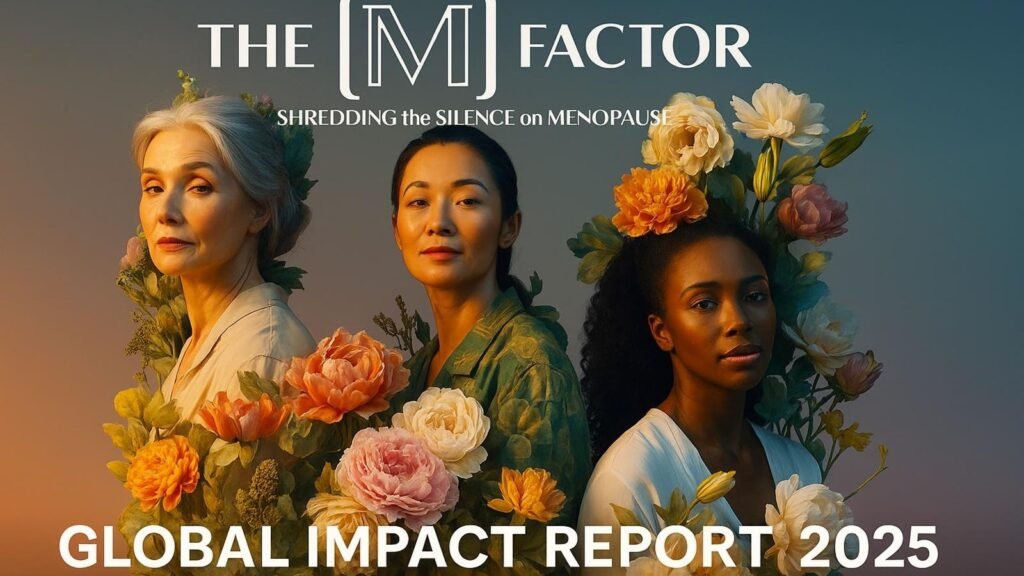A recent study reveals the profound impact of The M Factor film on reshaping public perception, clinical care, and global discourse surrounding menopause.
When The M Factor film premiered in late 2024, it diverged from traditional health documentaries and standard films. It had a grassroots approach, with interviews even filmed on iPhones by two former TV journalists committed to sharing stories like their own. Despite its unconventional production, the film, featuring advocates like Naomi Watts and Halle Berry, has made a significant impact on the global discourse on menopause.
Earlier this year, I discussed how the film sparked screenings and discussions worldwide. Now, the newly released M Factor Global Impact Report demonstrates the extensive reach of the movement and the transformative impact it has had on women globally.
A Short Film with a Massive Reach
The film was screened in all 50 U.S. states and reached 159 major domestic markets. Internationally, it was shown in over 50 countries, including Ghana, the United Arab Emirates, and Germany. A significant milestone was achieved in January 2025 when The M Factor was featured at the World Economic Forum in Davos, marking the first time menopause was addressed at such a prominent global event.
Joanne LaMarca Mathisen, one of the film’s producers and a former television executive with NBC’s Today Show, expressed, “The response exceeded our expectations. The film has reached a vast number of women, showcasing the dire need for information, not just in the U.S. but worldwide.”
Despite its humble beginnings, the film succeeded in bringing menopause into mainstream conversations and empowering women globally to advocate for their health and well-being.
Significant Impact on Women
According to the report, The M Factor brought about substantial changes among viewers:
- 80% of women reported a better understanding of perimenopause, menopause, and postmenopause after watching.
- 75% expressed an increased likelihood of consulting a doctor.
- 85% felt empowered to discuss menopause with friends and family, marking a crucial shift in a topic often kept private or misunderstood.
Many women revealed that the film helped them recognize and validate symptoms previously attributed to aging, stress, or burnout. It broke the silence surrounding early-stage symptoms like brain fog, anxiety, and sleep disturbances.
Educating Healthcare Providers
The impact wasn’t limited to women. Healthcare professionals were also significantly influenced by the film. Over 3,200 clinicians earned Continuing Medical Education (CME) credits after viewing the film. According to the report:
- 100% of CME participants reported a change in their practice.
- Self-reported “expert” knowledge on menopause increased from 33% to 60%.
- Comfort discussing menopause rose by 25%.
The film has been integrated into several medical school curricula and serves as a continuing education tool across various specialties. It also spurred national policy discussions, including the first U.S. Senate briefing on menopause hosted by Senator Patty Murray.
Denise Pines, a partner at Women in the Room Productions and a film producer, stated, “The feedback from doctors, even those with some menopause training, indicated a 400% increase in provider confidence. It proved that storytelling can drive actionable change.”
Halle Berry
Changing Perceptions of Hormone Therapy
One of the most significant revelations in the report is the shift in women’s perception of hormone replacement therapy (HRT), historically surrounded by fear, misinformation, and outdated science.
Prior to watching the film, only 56% of respondents believed HRT was safe or effective. Many, especially those in perimenopause, harbored concerns stemming from past studies and a lack of updated guidance.
After viewing the film:
- 92% believed HRT was safe or effective.
- 83% expressed intent to research HRT further.
- 67% planned to consult a provider about menopause or HRT—a 36-point increase from pre-screening levels.
Addressing Women’s Needs
The impact report highlighted the top resources and solutions women are seeking:
- Telehealth services (68%).
- Hormone-related products (63%).
- Nutrition and fitness support (50%).
- Menopause-trained healthcare providers (49%).
Crucially, the report emphasized perimenopause as a critical yet often misunderstood stage, where symptoms begin but care is frequently delayed. In response, the producers of The M Factor announced a follow-up film focusing on perimenopause in Spring 2026.
LaMarca Mathisen stated, “We believe The M Factor initiated a global movement, and this is just the start. It empowered women to demand proper healthcare.”
The M Factor demonstrates how a concise, accessible film grounded in real-world storytelling can reshape public perceptions, enhance provider practices, and inform health policy. With the upcoming film on perimenopause in 2026, the filmmakers are poised to continue transforming menopause care for women at every stage.


